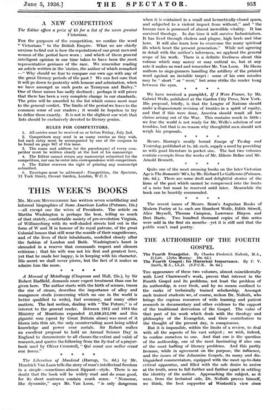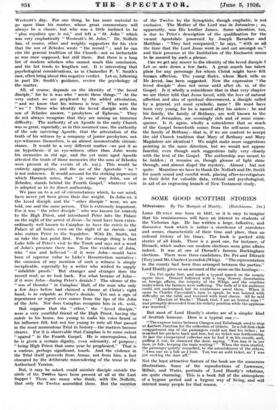THE AUTHORSHIP OF THE FOURTH GOSPEL
The Fourth Evangelist. By Charles Frederick Nolloth, MA., D.Litt. (John Murray. 10s. 6d.) The Fourth Gospel: Its Historical Importance. By P. V. Smith, M.A., LL,D. (S.P.O.K. 3s. Bd.) THE appearance of these two volumes, almost coincidentally with Lord Charnwood's work, proves that interest in the
Fourth Gospel and its problems, not least the problem of its authorship, is ever fresh, and by no means confined to the ranks of technically trained scholarship. Amongst such trained students we, of course, reckon Dr. Nolloth, who brings the copious resources of wide learning and patient research in documentary and other evidence to the support of the traditional derivation of the Gospel. The value of that part of his work which deals with the theology • and philosophy of the Evangelist, and their contribution to the thought of the present day, is conspicuous.
But it is impossible, within the limits of a review, to deal with all the aspects of his vast subject ; we wish, indeed, to confine ourselves to one. And that one is the question of the authorship, one of the most fascinating if also one of the most baffling of literary problems. And this partly because, while in agreement on the purpose, the influence, and the issues of the Johannine Gospels, its many and dis- tinguished commentators, equipped with the most up-to-date critical apparatus, and filled with the sole desire to arrive at the truth, seem to fall further and further apart in settling the identity of the author. Approaching the subject, as it
were, from the technical side, Dr. Nolloth proves himself, we think, the best supporter of Westcott's view since Westcott's day. For one thing, he has more material to go upon than his master, whose great commentary will always be a classic, but who was a little inclined to be " plus royaliste que le roi," and left a " St. John" which was very emphatically " Westcott's St John." Dr. Nolloth has, of course, other and weighty supporters for his view that the son of Zebedee wrote " the record " ; and he can cite the general tradition of the Church—not so ineluctable as was once supposed, -but still there. But there is a long list of modern scholars who cannot reach this conclusion, and the list tends to lengthen out. It is interesting that psychological considerations, as in Chancellor P. V. Smith's case, often bring about this negative verdict. Let us, following in part Dr. Smith's guidance, review the psychology of the matter.
All, of course, depends on the identity of " the loved disciple," for he it waa, who " wrote these things."' -At the very outset we are perplexed by the added attestation, " and we know that his witness is true." Who were the " we " ? Those who identify the loved disciple with the son of Zebedee answer, " presbyters of Ephesus." They do not always recognize that they are raising an immense difficulty. The authority of an Apostle in the early Church was so great, especially, as in this assumed case, the authority of the sole surviving Apostle, that the attestation of the truth of his witness by a company of junior presbyters, not eye-witnesses themselves, is an almost inconceivable circum- stance.. It would be a very different matter—we put it as an hypothesis—if an eye-witness other than John wrote his memories in old age, and the yet more aged Apostle attested the truth of those memories (for the. sons of Zebedee were present at the events of ch. xxi.). This would be entirely appropriate, and the use of the Apostolic " we ** is not unknown. It would account for the striking impression which Harnack notes, that " in some way John, son of Zebedee, stands behind the Fourth Gospel," whatever view is adopted as to its direct authorship.
We pass on to a set of circumstances which, to our mind, have never yet been given their due weight. In John xx. 2 the loved disciple and the " other disciple " were, we are told, one and the same person. This is extremely important. For it was " the other disciple who was known (or related) to the High Priest, and introduced Peter into the Palace on the night of the arrest of Jesus—he must have been extra- ordinarily well known to Caiaphas to have the entree to the Palace at all hours, even on the night of an emeute—and who outran Peter to the Sepulchre. With Dr. Smith, let us take the last point first. For the strange thing is that Luke tells of Peter's visit to the Tomb and says not a word of John's presence there too. Now the evidence of John, who " saw and believed "—if it were John—would have been of supreme value to Luke's Resurrection narrative : the omission of any mention of such a witness is simply inexplicable, especially by a writer who wished to supply " infallible proofs." But stranger and stranger does the record read, as we look back. For what became of John— if it were John—during Peter's denials ? The silence of the " son of thunder in Caiaphas' Hall, of the man who only a few days before had claimed a throne at Christ's right hand, is as culpable as Peter's denials. Yet not a sign of repentance or regret ever comes from the lips of the John of the Acts. Nor does Caiaphas recognize him in eh. xviii.
But suppose that the " other," the " loved disciple," were a very youthful -friend of the High Priest, having the entrée to his house, too young to make his voice 'heard or his influence felt, but not too young to note all that passed in the most momentous Trial in history—the matters become clearer. For it is observable that Caiaphas is to some extent " spared " in the Fourth Gospel. He is unscrupulous, but he is given a certain dignity, even solemnity, of purpose ; " being High Priest that same year he prophesied." That is a curious, perhaps significant, touch. And the violence in the trial itself proceeds from Annas, not from him, a fact obscured by the deliberate misrendering of the tense in the Authorized Version. ,
But, it may be asked, could another disciple outside the circle of the Twelve have been present at all at the Last Supper ? There are many who. think, with Dr. Nolloth, that . only the Twelve assembled there. But the mention
of the Twelve by the Synoptists, though emphatic, is not exclusive. The Mother of the Lord was in Jeiusalem ; so, apparently, was His brother James,. Some attention, too, is due to Peter's description •of the qualification for the vacant Apostolate possessed by. Joseph Barsabas and Matthias : " They had companied," he says, ".with us all the time that the Lord Jesus went in and out amongst us," and their presence at the Institution of the Eucharist seems to be assured-by-suck a phrase.
Can we get any. nearer to-the identity of the loved disciple ? Let , us note -down a few. fa,ets. A great search has taken place for any. personage for whom Christ might have felt luuban affection. The young Ruler, whom Mark tells us He Joved, -has: been suggested. Now the expression "the loved disciple " does not occur until after ch. xi. of the Gospel. Is.it wholly a coincidence that in that very chapter we are thrice told. that Jesus loved, with the love of natural affection and also of spiritual discernment, a disciple called by a general, yet most symbolic, name ? He must have been _very young, for he is named after his sisters : he and his family, the_ family of. Bethany, are well known to the Jews of Jerusalem, are seemingly rich and of some conse- quence. Is it, again, wholly a coincidence that so much of the Gospel henceforth comes from the self-same source, the family of Bethany—that is, if we are _content to accept the old Church tradition that Mary of Bethany and Mary Magdalene are identical ? We might make more suggestions pointing in the, same direction, but we would not appear fanciful, even though such suggestions tally , very . closely with the text of the Gospel. The authorship .was meant to be hidden ; it remains so, though gleams of light shine through, and Almost dispel the mystery. Almost ; but not quite. Meantime we have to thank Dr. Nolloth and Dr. Smith for much sound and careful work, placing after-investigators in their debt for valuable data, critical and psychological, in aid of an engrossing branch of New Testament study.











































 Previous page
Previous page